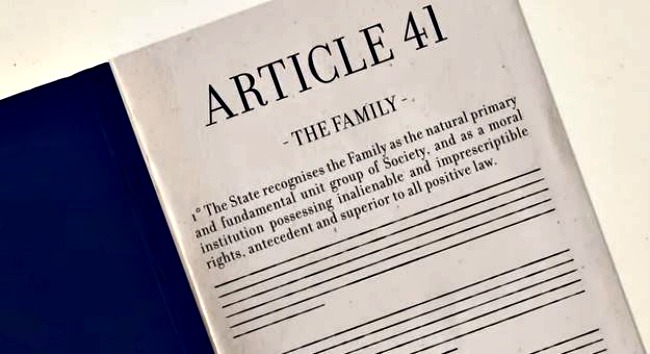One of the arguments we used in the marriage referendum of two years ago was that a change to the constitutional definition of the family would take away the natural right of a child to a mother and a father. This was strongly denied by the Yes side, but an article by a law lecturer at University College Galway suggests we were correct.
Backed up by a lengthy legal opinion by respected Senior Counsel, Michael Collins, we said that the right to marry also confers a legal right to procreate. We said that for same-sex couples this could only be achieved by the use of donor sperm or eggs and/or by hiring a surrogate mother.
We argued that this would automatically remove the natural right of a child to be raised by the two people – the man and the woman – who have brought the child into the world.
Two arguments were used against us. The first was that a child doesn’t have a right to a mother and a father because not all children are raised by a mother and a father. This was a ridiculous argument. The fact that a right cannot always be realised does not mean it does not exist. A right should never be deliberately interfered with, which is what the redefinition of the family did to the rights of children.
In addition, if a child does not have a natural right to a mother and a father (every child obviously has a mother and father) then why does a same-sex couple have a right to have children? Where does that right come from?
The second argument was that same-sex couples already had a right to have a family via the Children and Family Relationships Act, also passed in 2015. Our counterargument was that the change to the Constitution would copperfasten that right, seal it in constitutional cement.
Now it turns out that the relevant provisions of the Children and Family Relationships Act have not ‘commenced’, as the term goes, that is, they are not yet active, meaning that a same-sex married couple who acquired a child via Assisted Human Reproduction cannot yet both be recognised as the legal parents of the child.
Writing in the Journal.ie last week, Brian Tobin of NUI Galway says this goes against the amended Article 41 of the Constitution (‘The Family’).
He argues: “Lesbian married couples cannot procreate without the assistance of a sperm donor so the commencement of the legislation is essential to enable the spouse who does not give birth to establish her parental rights in respect of the child. Indeed, the State has a duty to protect all married families under Article 41 of the Constitution.” (My italics).
Further on, he writes: “Finally, the State has yet to regulate surrogacy, the only means by which a male same-sex married couple can procreate with assistance.” (A Bill on surrogacy is due to be published shortly).
Dr Tobin appears to be using the same argument we were using in 2015, although to very different effect. We said changing the Constitution would give same-sex couples a right to ‘procreate’ and this would be a bad thing given a child’s natural right to a mother and a father.
Dr Tobin says the change to Article 41 does indeed give a same-sex married couple a legal right to ‘procreate’ and it is a bad thing that this still has not taken effect.
One way or the other, Dr Tobin appears to be vindicating the argument we made two years ago in that fateful referendum.
















